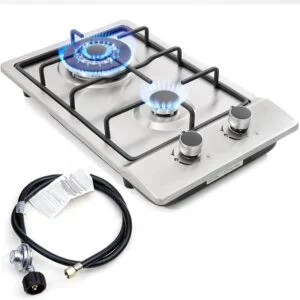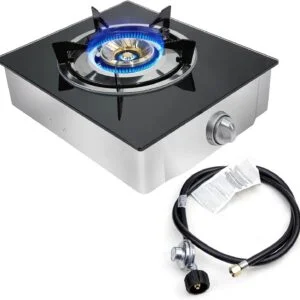Small Camping Stoves
Showing all 2 resultsSorted by popularity
-

Forimo 12-Inch Stainless Steel Gas Cooktop with 2 Burners, Drop-in Propane/Natural Gas Cooker, Dual Fuel 12″ Gas Stove Top for Easy Cleaning (12″W x 20″L)
$99.99 -

Forimo Portable Propane Gas Cooktop, Single Burner Stove with Auto Ignition, Tempered Glass, Ideal for Camping, RVs, Apartments, and Outdoor Cooking
$55.99
Small Camping Stoves: Compact Cooking Solutions for Outdoor Adventures
Camping is all about immersing oneself in nature, leaving behind the hustle and bustle of daily life, and enjoying the simplicity of outdoor living. As any experienced camper knows, having a reliable and efficient cooking solution is essential for a successful trip. Small camping stoves have become a popular choice among outdoor enthusiasts due to their portability, ease of use, and ability to provide a hot meal in the great outdoors.
What are Small Camping Stoves?
Small camping stoves are compact, lightweight cooking appliances designed to be easily carried and used during outdoor activities like camping, hiking, backpacking, and picnicking. They come in various shapes, sizes, and fuel types, but they all share the common goal of providing a reliable heat source for preparing meals and boiling water.
Portability and Lightweight Design
One of the most significant advantages of small camping stoves is their portability. They are specifically engineered to be lightweight and easy to carry, making them ideal for backpackers or those with limited packing space. Many small stoves can fold up or disassemble into a compact size, making them convenient to stow away in a backpack, camping gear, or even a pocket.
Fuel Options
Small camping stoves are available in different fuel options to suit various preferences and camping conditions. The most common types of fuel used in these stoves are:
Canister Stoves: These stoves use pre-pressurized fuel canisters, usually containing isobutane or propane gas. Canister stoves are popular for their ease of use, quick setup, and efficient cooking performance. They are particularly suitable for short trips and campers who prioritize convenience.
Liquid Fuel Stoves: Liquid fuel stoves, such as white gas stoves, use liquid fuel stored in refillable bottles. These stoves are more versatile and efficient, performing well in extreme weather conditions and at high altitudes. Though they require more maintenance and setup time, they are favored by long-distance backpackers and wilderness explorers.
Alcohol Stoves: Alcohol stoves burn denatured alcohol or methylated spirits. They are the lightest and simplest type of camping stoves, suitable for ultralight backpacking. While alcohol stoves have a slower cooking time, they are an eco-friendly option with easy-to-find fuel sources.
Easy to Use
Small camping stoves are designed for straightforward operation. Most models feature simple ignition mechanisms, making them user-friendly, even for beginners. With minimal setup and ignition steps, campers can quickly start cooking their favorite outdoor meals.
Environmentally Friendly
Many small camping stoves, especially those that use alcohol or other eco-friendly fuels, have a lower impact on the environment compared to traditional campfires. They leave no trace, reduce fire risks, and help preserve the natural beauty of campsites for future generations.
Safety Considerations
Although small camping stoves are generally safe to use, users should still exercise caution during setup, operation, and storage. Ensure the stove is placed on a stable surface away from flammable materials and follow the manufacturer’s guidelines for proper use.
Conclusion
Small camping stoves are indispensable companions for any outdoor adventure. Their compact size, lightweight design, and various fuel options make them versatile and practical for campers, hikers, and backpackers alike. Whether you’re embarking on a solo camping trip or enjoying a family picnic, a small camping stove can elevate your outdoor experience by providing a reliable and efficient cooking solution in the heart of nature.
Always remember to practice Leave No Trace principles and respect local regulations to preserve the beauty and integrity of our outdoor spaces for generations to come.


